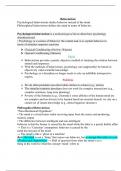College aantekeningen
Philosophy and Psychology Summary, VU 2 year
Lectures covered: Lecture 2: Behaviorism & Identity Theory Lecture 3: Functionalism & Computationalism Lecture 4: 4E Cognition Lecture 6: Philosophy of Science: Introduction – Scientific Reasoning Lecture 7: Replication & Communication Lecture 8: Scientific Progress and Values Lecture 9: C...
[Meer zien]




